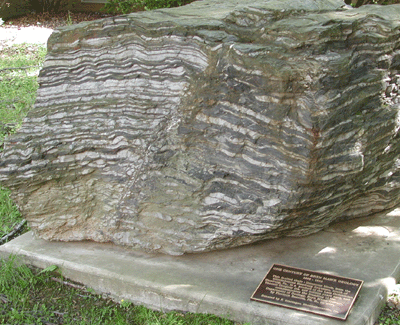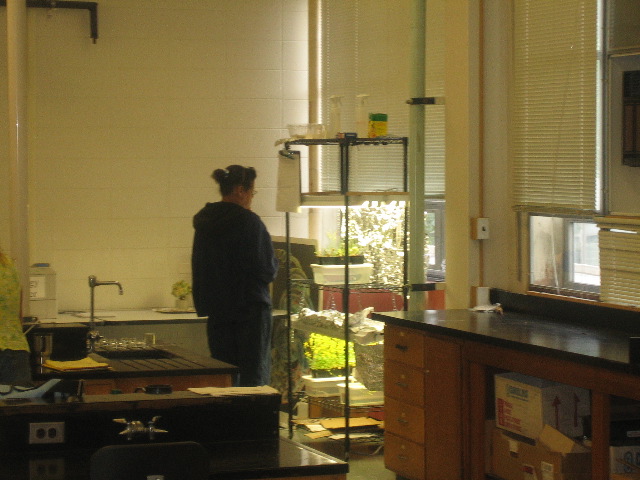October 2, 2005 Draft The Irreducibility of Outside/In:
An Exploration into (and out of) the
Limit Conditions of Science Education
Anne Dalke, Wil Franklin
and Philadelphia K-12 Public School Teachers

...it was very difficult for me to understand that so many of my sixth graders already saw themselves as outsiders, and therefore, not entitled to this country's plums. You can't be an achiever and an outsider at the same time. I think these children need to be courted, to be won over, to be reassured that they are entitled to those plums, and to driven toward success. Margaret Robertson, Philadelphia Public School Teacher
Science has the potential to be what we all collectively need as we evolve into a world wide community: a nexus point that encourages and supports the evolution of shared human stories of exploration and growth, an evolution in which all human beings are involved and take pride. For this to happen, we all need to work much harder to not only reduce the perception of science as a specialized and isolated activity of the few but to make it in fact the product and property of all human beings. Paul Grobstein, Director, Center for Science in Society, Bryn Mawr College, Revisiting Science in Culture
We are a biologist and a literary critic who took on this work together, with great good will and a lot of energy--and found ourselves intrigued by (and so want here to think-through and write out) the complexities of its "working out." In the summer of 2005, we co-directed an institute for K-12 public school teachers supported by the Howard Hughes Medical Institute. We called our project, which was hosted by Bryn Mawr College, and is fully archived at http://serendipstudio.org/local/suminst/eei05/, "Making Sense of Change: Hands-on Science Across the Curriculum." Our group was quite varied in terms of preparation and engagement: some of the participants had very little science background; others had masters' in science education. The classes they themselves taught spanned kindergarten to high school. Some of them were long-time veterans of earlier institutes sponsored by the College, while others had no such experience. Some thought of change as "an old friend"; for others it was a "challenge," "terrifying," to be avoided in a search for what was stable and lasting.
What we discovered, in working with these teachers, is that science education--in particular the progressive, innovative, hands-on, inquiry-based classroom science of the past decade, which has been so deliberative in its attempts to bring those traditionally "outside" science "into" its various fields--has fallen short. It has failed to take account of a central facet of human psychological development: the Catch-22 of the persistent human impulse to put oneself "out," to refuse incorporation into any system that presumes to "know" or "predict" the direction of self-growth. The psychological theory that articulates this great irony, that the act of recognition is always an act of "fixing," a form of "policing," and thus will always, on some level, be resisted, goes back at least as far as Hegel's essay on "Lordship and Bondage" (1807). In the past century, it has found its most compelling articulation in the work of Michel Foucault, and repeated refinement and elaboration, in the decades since, by queer theorists such as Michel Warner and Diane Fuss, for whom "outing" has always, and simultaneously, two meanings, both "coming into presence" and being "on the outside."
We structure this essay, accordingly, around four scenes from our classroom: two of them attempted movements "from the inside out," two others as-apparent movements "from the outside in," before ending our reflections with a fifth event, in which this vocabulary is turned "upside down," in order to re-figure "in" and "out" not as polar reversals of one another, but rather--following Wittgenstein--as "alongside, in a condition of "neighborliness," "adjacency," or "family resemblance." What we discovered, in working with the Philadelphia teachers, is that however "out" the inside, as it is incorporated, another outside is always generated alongside. As Stanley Fish says so clearly in a larger pedagogical context, difference is "the remainder that escape the drawing of any line, no matter how generous...the lesson [is] its irreducibility" (Dalke 102).
I. Outside "Change"
 |
All that you touch
You Change.
All that you Change
Changes you.
The only lasting truth
Is Change
God
Is Change.
Octavia Butler. "Earthseed: The Books of the Living."
Parable of the Sower (1993) |
"The only lasting truth is Christ. Therefore, on Christ, The Solid Rock, I stand. God is not change. He is stability....God always was, is, and will be. God is stable. Change is constant." Miss T." (Public High school principal and participant in Summer Institute)
story of opening gesture, incorporating religious language--and how it was resisted, kept "outside"
lesson on cosmology, and how it was received
II. Outside "Science"
 | Randall's query: "What do our kids care about?
What is made out of marble, that they would mind losing?
Can we use that as an incentive to learn? |
We spent two weeks wrapping our brains around getting things less wrong...then this week we return to the experiment format with expectated results. My poor brain is smoking!!!!!! How can the concept of getting it less wrong translate to experimantation and safety rules? Are we as teacher setting ur kids up to be afraid of science and afraid to get it wrong? What happens to creativity and facilitated, gradually scafoldded discovery?
As I am trying to make sence of the changes between Summer Institutes, I feel that today's lab return us to the correct answer, experiment format. HELP!!!!!!!!!!
Is this what it feel like to our students to move from a more abstract style techer to a more linear, conservative style teacher?????????? Antoinette, "Getting it Less Wrong???"
story of Hands-on Science and Math
reaction to behaviorism
III. Inside "Science"
 | "Stories, as summaries of observations, aren't necessarily completely invalidated by new less wrong stories summarizing more observations. Older stories may remain effective/useful as summaries of particular sets of observations (we still use the stories of the earth as flat and of the sun going around it in much of day to day life)." |
Paul's categorizing exercise: keeping several stories in play
(and the grounds for distinguishing among them...?)
Caterpillars Make Choices...and the participants get confused
IV. Inside "Culture"

Metamorphosis in Literature
hyperthesis --> going over/above/beyond our observations:
exploring what we cannot see, but want, or need, or wish for,
adding meaning to what we see
leading to...all those stories about shame
V. Outside/In

the mini-symposium: clearly articulating the outside
the performative assessments: outing what's in there, performing what you have, not what you need
VI. Conclusions: On What is Irreducible...







